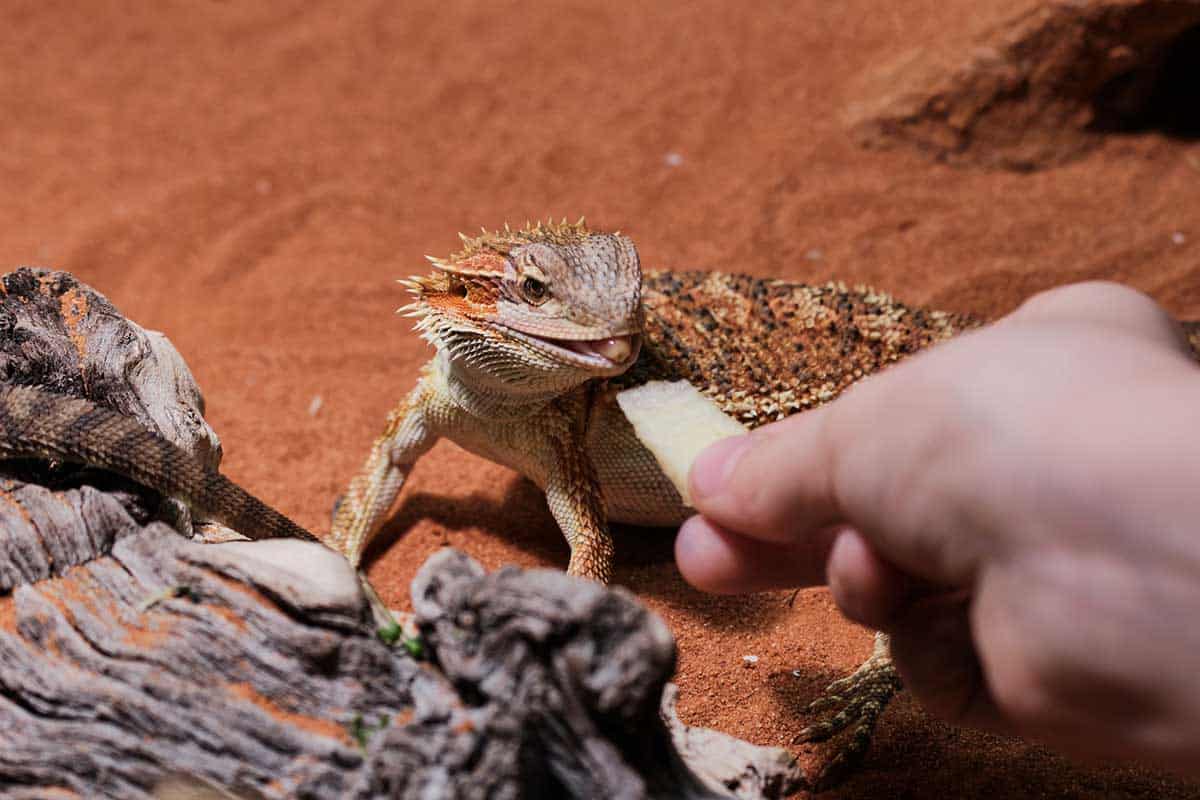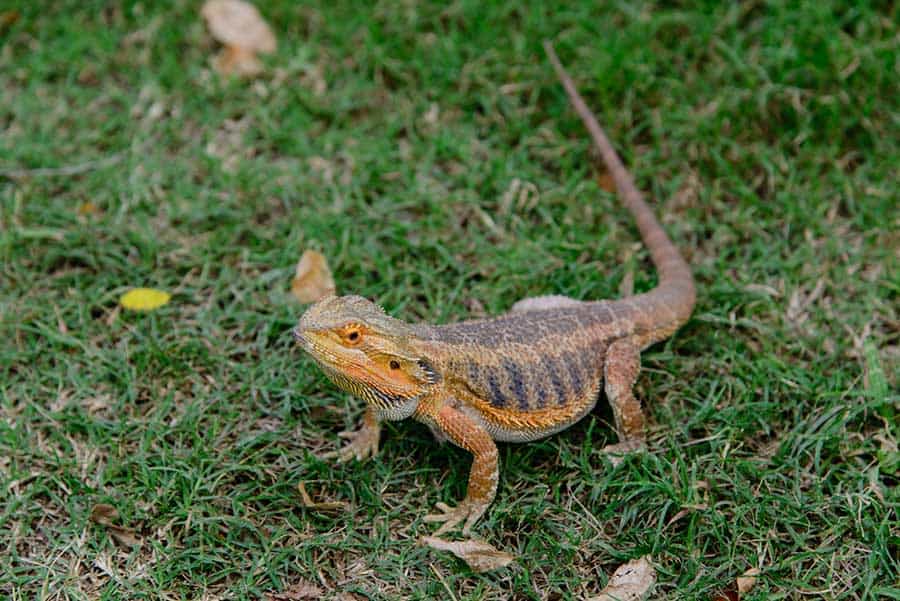
New bearded dragon owners need the answer to the question: what fruits can bearded dragons eat? Bearded dragons mainly eat insect protein and vegetables, but they also should eat a small amount of fruits and flowers.
Although bearded dragons get the majority of their nutrition from insects and vegetables, a diet based only on staple insects and vegetables can become boring! Many different kinds of fruits can provide your beardie with unique tastes and textures, which will encourage their interest in their food.
Eating food is one of the best parts of the day for many humans, but it can be just as exciting for your bearded dragon, too! Their salads should be nutritious and healthy with lots of variety, which makes them taste and smell good as well as look interesting.
In this article, I will outline precisely what greens, vegetables, and fruits are safe and can form part of your bearded dragon’s daily salad. In addition, this article will detail what vegetables are toxic to bearded dragons so you can keep your beardie safe.
Staple Fruits
Fruit contains a lot of natural sugars. This makes them delicious, but it also makes them unhealthy in large quantities.
Only around 5% to 10% of your bearded dragon’s diet should be made up of fruit. This is because too much fruit will lead to obesity and mouth rot.
Fruit is soft, which means it can get stuck between your bearded dragon’s teeth. If fruit sticks between the teeth and is not cleared out by other more fibrous food like vegetables or greens, then it can start to ferment and rot. This, in turn, leads to tooth and gum decay, exactly like in humans!
Fruits contain a large amount of water, which aids in maintaining hydration. For a closer look at what a bearded dragon needs in terms of hydration, have a look at our article dedicated to spotting when your bearded dragon is dehydrated and how to remedy the situation at home.
So what fruits can bearded dragons eat? Remember that fruit should be treated more as a treat or fun item to add to the salad rather than making up a core component of it. Most bearded dragons love fruits as treats.
Safe fruits to include in your bearded dragon’s diet are:
- Apples
- Blackberries
- Strawberries
- Blueberries
- Bananas (make sure your beardie eats something very fibrous after bananas and other soft, chewy fruits!)
- Watermelon
- Sweet melon
- Plums
- Pears
- Grapes (always seedless)
Many fruits have seeds, pips, stones, and pits in them. You must remove all of these before you offer them to your bearded dragon. If your beardie eats these, they may choke on them. Alternatively, these seeds and pits can cause impaction in the gut or release toxic gasses as they are digested.
Like certain vegetables, many fruits are also high in oxalates or oxalic acid. Oxalic acid interrupts the absorption of other vital nutrients. This is another reason why fruits should only make up a small percentage of your bearded dragon’s diet. Oxalic acid is most commonly found in grapefruits, avocados, and oranges.
Fruits that contain a medium amount of oxalates are raspberries, black berries, melons, blueberries, prunes, peaches, and papaya. These fruits still appear on our staple list because they are nutritious in other ways.
Anytime fruit that has a medium amount of oxalic acid in it, is included in your bearded dragon’s salad, make sure to pair it with a vegetable or dark green that is rich in
Toxic Foods
Some foods should not be fed to bearded dragons at all. This is because some of them will cause upset tummies, vitamin deficiencies, serious illness, or even death.

All citrus fruits should be avoided. Even though they are nutritionally beneficial for us and many other animals, citrus fruits contain citric acid. It is so acidic that it burns the sensitive digestive systems of reptiles. Oranges, lemons, limes, and grapefruit are some examples of citrus fruits.
Spicy vegetables like hot peppers and cauliflower should also be avoided. Capsaicin is the spicy component of chili peppers. While this provides some nice heat for human food, it is toxic to reptiles. The capsaicin will burn your lizard’s digestive tract and cause serious pain and cramping.
Other foods that are toxic to bearded dragons include the following:
- Eggplant (aubergine)
- Chives
- Onions
- Rhubarb
- Avocados
FAQs About Feeding Bearded Dragons
Can my bearded dragon eat flowers?
Yes, they can eat flowers. There are many kinds of flowers that are suitable for your beardie’s diet.
Safe flowers include:
- Rose petals
- Lavender buds
- Zucchini flowers
- Hibiscus
- Dandelion
- Clover
- Geraniums.
There are also many flowers that are not safe and will cause health issues and even death. Carefully research any flower before you add it to your bearded dragon’s daily salad.
Although flowers are tasty to bearded dragons, they do not have much nutritional value. However, it is still a good idea to occasionally add them to your bearded dragon’s salads because they smell good, taste interesting, and promote mental enrichment.
What insects can I feed my bearded dragon?
Insect protein is an important part of a bearded dragon’s diet. The most common feeder insects used as a staple item for bearded dragons are crickets.
However, there are many other insects that can form part of your bearded dragon’s diet, like dubia roaches and grasshoppers. Have a look at our guide on the best insects to feed your bearded dragon.
In addition to insects, there are also various other small invertebrates like worms that you can feed your bearded dragon. For an in-depth look at these worms and their nutritional benefits, check out our guide on the best worms for bearded dragons.
How often should I feed my bearded dragon?
The frequency of feeding times varies based on how old your bearded dragon is. Young bearded dragons should be fed three to four times a day, while adults should eat only once per day. Baby and juvenile dragons have much faster metabolisms and must eat more often to support their growing bodies.
For a more in-depth look at how often you should feed your bearded dragon, check out our guide here!
What ratio of food should I feed my bearded dragon?
When bearded dragons are babies and juveniles, they need far more protein in their diet because they are growing and developing their bones, muscles, and organs. However, as your bearded dragon reaches adulthood, they need less protein and more plant matter.
When your beardie is a baby, they should eat 70% to 80% insect protein and 20% to 30% vegetables and greens. Flowers and fruit can make up 5% to 10% of their diet.
However, as your beardie grows into adulthood, this ratio will gradually reverse where the majority of their diet will need to be made up of vegetables, and there is a large reduction in protein. This is because adult bearded dragons need to maintain their bodies instead of growing and developing.
Does my bearded dragon need supplements?
Yes! Bearded dragons need supplemental
A lack of
At the Tail End of Things…
Bearded dragons eat many different things in their daily salad so it is good to know what fruits bearded dragons can eat. However, it is important to remember that fruit must only make up a very small portion of your bearded dragon’s diet.
Too much fruit will cause obesity and lead to tooth and gum rot. Therefore, you need to balance out your bearded dragon’s daily salad with lots of safe vegetables and dark, leafy greens to provide optimal nutrition as well as healthy fiber for the gut.
Good luck on your journey to feeding your bearded dragon the healthiest and safest salad you can make!

